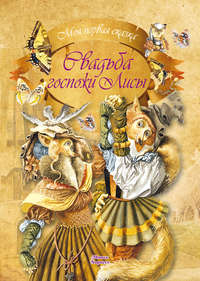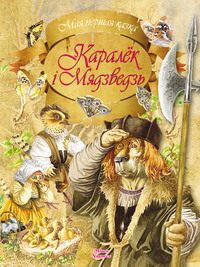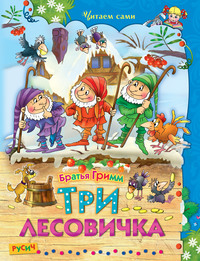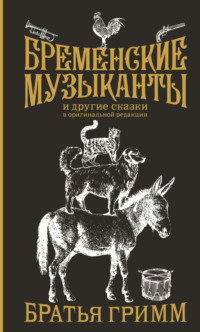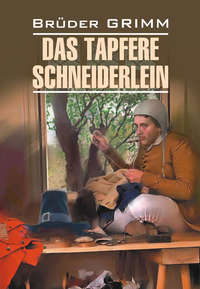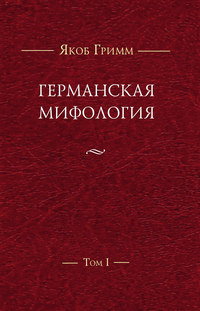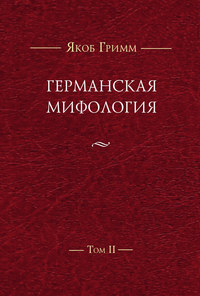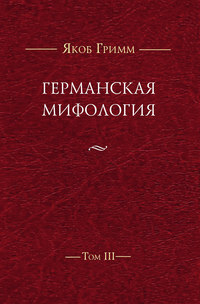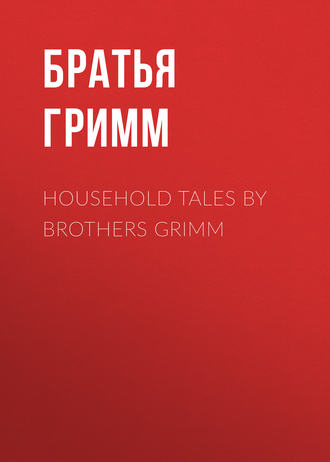 полная версия
полная версияHousehold Tales by Brothers Grimm
And the King sent two waiting-maids and two attendants into the tower, to fetch the Queen and bring her to the royal table. But when she was led in she ate nothing, and said, "The gracious and merciful God who has supported me in the tower, will speedily deliver me." She lived three days more, and then died happily, and when she was buried, the two white doves which had brought her food to the tower, and were angels of heaven, followed her body and seated themselves on her grave. The aged King ordered the cook to be torn in four pieces, but grief consumed the King's own heart, and he soon died. His son married the beautiful maiden whom he had brought with him as a flower in his pocket, and whether they are still alive or not, is known to God.
77 Clever Grethel
There was once a cook named Grethel, who wore shoes with red rosettes, and when she walked out with them on, she turned herself this way and that, and thought, "You certainly are a pretty girl!" And when she came home she drank, in her gladness of heart, a draught of wine, and as wine excites a desire to eat, she tasted the best of whatever she was cooking until she was satisfied, and said, "The cook must know what the food is like."
It came to pass that the master one day said to her, "Grethel, there is a guest coming this evening; prepare me two fowls very daintily." "I will see to it, master," answered Grethel. She killed two fowls, scalded them, plucked them, put them on the spit, and towards evening set them before the fire, that they might roast. The fowls began to turn brown, and were nearly ready, but the guest had not yet arrived. Then Grethel called out to her master, "If the guest does not come, I must take the fowls away from the fire, but it will be a sin and a shame if they are not eaten directly, when they are juiciest." The master said, "I will run myself, and fetch the guest." When the master had turned his back, Grethel laid the spit with the fowls on one side, and thought, "Standing so long by the fire there, makes one hot and thirsty; who knows when they will come? Meanwhile, I will run into the cellar, and take a drink." She ran down, set a jug, said, "God bless it to thy use, Grethel," and took a good drink, and took yet another hearty draught.
Then she went and put the fowls down again to the fire, basted them, and drove the spit merrily round. But as the roast meat smelt so good, Grethel thought, "Something might be wrong, it ought to be tasted!" She touched it with her finger, and said, "Ah! how good fowls are! It certainly is a sin and a shame that they are not eaten directly!" She ran to the window, to see if the master was not coming with his guest, but she saw no one, and went back to the fowls and thought, "One of the wings is burning! I had better take it off and eat it." So she cut it off, ate it, and enjoyed it, and when she had done, she thought, "the other must go down too, or else master will observe that something is missing." When the two wings were eaten, she went and looked for her master, and did not see him. It suddenly occurred to her, "Who knows? They are perhaps not coming at all, and have turned in somewhere." Then she said, "Hallo, Grethel, enjoy yourself, one fowl has been cut into, take another drink, and eat it up entirely; when it is eaten you will have some peace, why should God's good gifts be spoilt?" So she ran into the cellar again, took an enormous drink and ate up the one chicken in great glee. When one of the chickens was swallowed down, and still her master did not come, Grethel looked at the other and said, "Where one is, the other should be likewise, the two go together; what's right for the one is right for the other; I think if I were to take another draught it would do me no harm." So she took another hearty drink, and let the second chicken rejoin the first.
While she was just in the best of the eating, her master came and cried, hurry up, "Haste thee, Grethel, the guest is coming directly after me!" "Yes, sir, I will soon serve up," answered Grethel. Meantime the master looked to see that the table was properly laid, and took the great knife, wherewith he was going to carve the chickens, and sharpened it on the steps. Presently the guest came, and knocked politely and courteously at the house-door. Grethel ran, and looked to see who was there, and when she saw the guest, she put her finger to her lips and said, "Hush! hush! get away as quickly as you can, if my master catches you it will be the worse for you; he certainly did ask you to supper, but his intention is to cut off your two ears. Just listen how he is sharpening the knife for it!" The guest heard the sharpening, and hurried down the steps again as fast as he could. Grethel was not idle; she ran screaming to her master, and cried, "You have invited a fine guest!" "Eh, why, Grethel? What do you mean by that?" "Yes," said she, "he has taken the chickens which I was just going to serve up, off the dish, and has run away with them!" "That's a nice trick!" said her master, and lamented the fine chickens. "If he had but left me one, so that something remained for me to eat." He called to him to stop, but the guest pretended not to hear. Then he ran after him with the knife still in his hand, crying, "Just one, just one," meaning that the guest should leave him just one chicken, and not take both. The guest, however, thought no otherwise than that he was to give up one of his ears, and ran as if fire were burning under him, in order to take them both home with him.
78 The Old Man and His Grandson
There was once a very old man, whose eyes had become dim, his ears dull of hearing, his knees trembled, and when he sat at table he could hardly hold the spoon, and spilt the broth upon the table-cloth or let it run out of his mouth. His son and his son's wife were disgusted at this, so the old grandfather at last had to sit in the corner behind the stove, and they gave him his food in an earthenware bowl, and not even enough of it. And he used to look towards the table with his eyes full of tears. Once, too, his trembling hands could not hold the bowl, and it fell to the ground and broke. The young wife scolded him, but he said nothing and only sighed. Then they bought him a wooden bowl for a few half-pence, out of which he had to eat.
They were once sitting thus when the little grandson of four years old began to gather together some bits of wood upon the ground. "What are you doing there?" asked the father. "I am making a little trough," answered the child, "for father and mother to eat out of when I am big."
The man and his wife looked at each other for a while, and presently began to cry. Then they took the old grandfather to the table, and henceforth always let him eat with them, and likewise said nothing if he did spill a little of anything.
79 The Water-Nix
A little brother and sister were once playing by a well, and while they were thus playing, they both fell in. A water-nix lived down below, who said, "Now I have got you, now you shall work hard for me!" and carried them off with her. She gave the girl dirty tangled flax to spin, and she had to fetch water in a bucket with a hole in it, and the boy had to hew down a tree with a blunt axe, and they got nothing to eat but dumplings as hard as stones. Then at last the children became so impatient, that they waited until one Sunday, when the nix was at church, and ran away. But when church was over, the nix saw that the birds were flown, and followed them with great strides. The children saw her from afar, and the girl threw a brush behind her which formed an immense hill of bristles, with thousands and thousands of spikes, over which the nix was forced to scramble with great difficulty; at last, however, she got over. When the children saw this, the boy threw behind him a comb which made a great hill of combs with a thousand times a thousand teeth, but the nix managed to keep herself steady on them, and at last crossed over that. Then the girl threw behind her a looking-glass which formed a hill of mirrors, and was so slippery that it was impossible for the nix to cross it. Then she thought, "I will go home quickly and fetch my axe, and cut the hill of glass in half." Long before she returned, however, and had hewn through the glass, the children had escaped to a great distance, and the water-nix was obliged to betake herself to her well again.
80 The Death of the Little Hen
Once upon a time the little hen went with the little cock to the nut-hill, and they agreed together that whichsoever of them found a kernel of a nut should share it with the other. Then the hen found a large, large nut, but said nothing about it, intending to eat the kernel herself. The kernel, however, was so large that she could not swallow it, and it remained sticking in her throat, so that she was alarmed lest she should be choked. Then she cried, "Cock, I entreat thee to run as fast thou canst, and fetch me some water, or I shall choke." The little cock did run as fast as he could to the spring, and said, "Stream, thou art to give me some water; the little hen is lying on the nut-hill, and she has swallowed a large nut, and is choking." The well answered, "First run to the bride, and get her to give thee some red silk." The little cock ran to the bride and said, "Bride, you are to give me some red silk; I want to give red silk to the well, the well is to give me some water, I am to take the water to the little hen who is lying on the nut-hill and has swallowed a great nut-kernel, and is choking with it." The bride answered, "First run and bring me my little wreath which is hanging to a willow." So the little cock ran to the willow, and drew the wreath from the branch and took it to the bride, and the bride gave him some water for it. Then the little cock took the water to the hen, but when he got there the hen had choked in the meantime, and lay there dead and motionless. Then the cock was so distressed that he cried aloud, and every animal came to lament the little hen, and six mice built a little carriage to carry her to her grave, and when the carriage was ready they harnessed themselves to it, and the cock drove. On the way, however, they met the fox, who said, "Where art thou going, little cock?" "I am going to bury my little hen." "May I drive with thee?" "Yes, but seat thyself at the back of the carriage, for in the front my little horses could not drag thee." Then the fox seated himself at the back, and after that the wolf, the bear, the stag, the lion, and all the beasts of the forest did the same. Then the procession went onwards, and they reached the stream. "How are we to get over?" said the little cock. A straw was lying by the stream, and it said, "I will lay myself across, and you shall drive over me." But when the six mice came to the bridge, the straw slipped and fell into the water, and the six mice all fell in and were drowned. Then they were again in difficulty, and a coal came and said, "I am large enough, I will lay myself across and you shall drive over me." So the coal also laid itself across the water, but unhappily just touched it, on which the coal hissed, was extinguished and died. When a stone saw that, it took pity on the little cock, wished to help him, and laid itself over the water. Then the cock drew the carriage himself, but when he got it over and reached the other shore with the dead hen, and was about to draw over the others who were sitting behind as well, there were too many of them, the carriage ran back, and they all fell into the water together, and were drowned. Then the little cock was left alone with the dead hen, and dug a grave for her and laid her in it, and made a mound above it, on which he sat down and fretted until he died too, and then every one was dead.
81 Brother Lustig
There was one on a time a great war, and when it came to an end, many soldiers were discharged. Then Brother Lustig also received his dismissal, and besides that, nothing but a small loaf of contract-bread, and four kreuzers in money, with which he departed. St. Peter had, however, placed himself in his way in the shape of a poor beggar, and when Brother Lustig came up, he begged alms of him. Brother Lustig replied, "Dear beggar-man, what am I to give you? I have been a soldier, and have received my dismissal, and have nothing but this little loaf of contract-bread, and four kreuzers of money; when that is gone, I shall have to beg as well as you. Still I will give you something." Thereupon he divided the loaf into four parts, and gave the apostle one of them, and a kreuzer likewise. St. Peter thanked him, went onwards, and threw himself again in the soldier's way as a beggar, but in another shape; and when he came up begged a gift of him as before. Brother Lustig spoke as he had done before, and again gave him a quarter of the loaf and one kreuzer. St. Peter thanked him, and went onwards, but for the third time placed himself in another shape as a beggar on the road, and spoke to Brother Lustig. Brother Lustig gave him also the third quarter of bread and the third kreuzer. St. Peter thanked him, and Brother Lustig went onwards, and had but a quarter of the loaf, and one kreuzer. With that he went into an inn, ate the bread, and ordered one kreuzer's worth of beer. When he had had it, he journeyed onwards, and then St. Peter, who had assumed the appearance of a discharged soldier, met and spoke to him thus: "Good day, comrade, canst thou not give me a bit of bread, and a kreuzer to get a drink?" "Where am I to procure it?" answered Brother Lustig; "I have been discharged, and I got nothing but a loaf of ammunition-bread and four kreuzers in money. I met three beggars on the road, and I gave each of them a quarter of my bread, and one kreuzer. The last quarter I ate in the inn, and had a drink with the last kreuzer. Now my pockets are empty, and if thou also hast nothing we can go a-begging together." "No," answered St. Peter, "we need not quite do that. I know a little about medicine, and I will soon earn as much as I require by that." "Indeed," said Brother Lustig, "I know nothing of that, so I must go and beg alone." "Just come with me," said St. Peter, "and if I earn anything, thou shalt have half of it." "All right," said Brother Lustig, so they went away together.
Then they came to a peasant's house inside which they heard loud lamentations and cries; so they went in, and there the husband was lying sick unto death, and very near his end, and his wife was crying and weeping quite loudly. "Stop that howling and crying," said St. Peter, "I will make the man well again," and he took a salve out of his pocket, and healed the sick man in a moment, so that he could get up, and was in perfect health. In great delight the man and his wife said, "How can we reward you? What shall we give you?" But St. Peter would take nothing, and the more the peasant folks offered him, the more he refused. Brother Lustig, however, nudged St. Peter, and said, "Take something; sure enough we are in need of it." At length the woman brought a lamb and said to St. Peter that he really must take that, but he would not. Then Brother Lustig gave him a poke in the side, and said, "Do take it, you stupid fool; we are in great want of it!" Then St. Peter said at last, "Well, I will take the lamb, but I won't carry it; if thou wilt insist on having it, thou must carry it." "That is nothing," said Brother Lustig. "I will easily carry it," and took it on his shoulder. Then they departed and came to a wood, but Brother Lustig had begun to feel the lamb heavy, and he was hungry, so he said to St. Peter, "Look, that's a good place, we might cook the lamb there, and eat it." "As you like," answered St. Peter, "but I can't have anything to do with the cooking; if thou wilt cook, there is a kettle for thee, and in the meantime I will walk about a little until it is ready. Thou must, however, not begin to eat until I have come back, I will come at the right time." "Well, go, then," said Brother Lustig, "I understand cookery, I will manage it." Then St. Peter went away, and Brother Lustig killed the lamb, lighted a fire, threw the meat into the kettle, and boiled it. The lamb was, however, quite ready, and the apostle Peter had not come back, so Brother Lustig took it out of the kettle, cut it up, and found the heart. "That is said to be the best part," said he, and tasted it, but at last he ate it all up. At length St. Peter returned and said, "Thou mayst eat the whole of the lamb thyself, I will only have the heart, give me that." Then Brother Lustig took a knife and fork, and pretended to look anxiously about amongst the lamb's flesh, but not to be able to find the heart, and at last he said abruptly, "There is none here." "But where can it be?" said the apostle. "I don't know," replied Brother Lustig, "but look, what fools we both are, to seek for the lamb's heart, and neither of us to remember that a lamb has no heart!" "Oh," said St. Peter, "that is something quite new! Every animal has a heart, why is a lamb to have none?" "No, be assured, my brother," said Brother Lustig, "that a lamb has no heart; just consider it seriously, and then you will see that it really has none." "Well, it is all right," said St. Peter, "if there is no heart, then I want none of the lamb; thou mayst eat it alone." "What I can't eat now, I will carry away in my knapsack," said Brother Lustig, and he ate half the lamb, and put the rest in his knapsack.
They went farther, and then St. Peter caused a great stream of water to flow right across their path, and they were obliged to pass through it. Said St. Peter, "Do thou go first." "No," answered Brother Lustig, "thou must go first," and he thought, "if the water is too deep I will stay behind." Then St. Peter strode through it, and the water just reached to his knee. So Brother Lustig began to go through also, but the water grew deeper and reached to his throat. Then he cried, "Brother, help me!" St. Peter said, "Then wilt thou confess that thou hast eaten the lamb's heart?" "No," said he, "I have not eaten it." Then the water grew deeper still and rose to his mouth. "Help me, brother," cried the soldier. St. Peter said, "Then wilt thou confess that thou hast eaten the lamb's heart?" "No," he replied, "I have not eaten it." St. Peter, however, would not let him be drowned, but made the water sink and helped him through it.
Then they journeyed onwards, and came to a kingdom where they heard that the King's daughter lay sick unto death. "Hollo, brother!" said the soldier to St. Peter, "this is a chance for us; if we can heal her we shall be provided for, for life!" But St. Peter was not half quick enough for him, "Come, lift your legs, my dear brother," said he, "that we may get there in time." But St. Peter walked slower and slower, though Brother Lustig did all he could to drive and push him on, and at last they heard that the princess was dead. "Now we are done for!" said Brother Lustig; "that comes of thy sleepy way of walking!" "Just be quiet," answered St. Peter, "I can do more than cure sick people; I can bring dead ones to life again." "Well, if thou canst do that," said Brother Lustig, "it's all right, but thou shouldst earn at least half the kingdom for us by that." Then they went to the royal palace, where every one was in great grief, but St. Peter told the King that he would restore his daughter to life. He was taken to her, and said, "Bring me a kettle and some water," and when that was brought, he bade everyone go out, and allowed no one to remain with him but Brother Lustig. Then he cut off all the dead girl's limbs, and threw them in the water, lighted a fire beneath the kettle, and boiled them. And when the flesh had fallen away from the bones, he took out the beautiful white bones, and laid them on a table, and arranged them together in their natural order. When he had done that, he stepped forward and said three times, "In the name of the holy Trinity, dead woman, arise." And at the third time, the princess arose, living, healthy and beautiful. Then the King was in the greatest joy, and said to St. Peter, "Ask for thy reward; even if it were half my kingdom, I would give it thee." But St. Peter said, "I want nothing for it." "Oh, thou tomfool!" thought Brother Lustig to himself, and nudged his comrade's side, and said, "Don't be so stupid! If thou hast no need of anything, I have." St. Peter, however, would have nothing, but as the King saw that the other would very much like to have something, he ordered his treasurer to fill Brother Lustig's knapsack with gold. Then they went on their way, and when they came to a forest, St. Peter said to Brother Lustig, "Now, we will divide the gold." "Yes," he replied, "we will." So St. Peter divided the gold, and divided it into three heaps. Brother Lustig thought to himself, "What craze has he got in his head now? He is making three shares, and there are only two of us!" But St. Peter said, "I have divided it exactly; there is one share for me, one for thee, and one for him who ate the lamb's heart."
"Oh, I ate that!" replied Brother Lustig, and hastily swept up the gold. "You may trust what I say." "But how can that be true," said St. Peter, "when a lamb has no heart?" "Eh, what, brother, what can you be thinking of? Lambs have hearts like other animals, why should only they have none?" "Well, so be it," said St. Peter, "keep the gold to yourself, but I will stay with you no longer; I will go my way alone." "As you like, dear brother," answered Brother Lustig. "Farewell."
Then St. Peter went a different road, but Brother Lustig thought, "It is a good thing that he has taken himself off, he is certainly a strange saint, after all." Then he had money enough, but did not know how to manage it, squandered it, gave it away, and and when some time had gone by, once more had nothing. Then he arrived in a certain country where he heard that a King's daughter was dead. "Oh, ho!" thought he, "that may be a good thing for me; I will bring her to life again, and see that I am paid as I ought to be." So he went to the King, and offered to raise the dead girl to life again. Now the King had heard that a discharged soldier was traveling about and bringing dead persons to life again, and thought that Brother Lustig was the man; but as he had no confidence in him, he consulted his councillors first, who said that he might give it a trial as his daughter was dead. Then Brother Lustig ordered water to be brought to him in a kettle, bade every one go out, cut the limbs off, threw them in the water and lighted a fire beneath, just as he had seen St. Peter do. The water began to boil, the flesh fell off, and then he took the bones out and laid them on the table, but he did not know the order in which to lay them, and placed them all wrong and in confusion. Then he stood before them and said, "In the name of the most holy Trinity, dead maiden, I bid thee arise," and he said this thrice, but the bones did not stir. So he said it thrice more, but also in vain: "Confounded girl that you are, get up!" cried he, "Get up, or it shall be worse for you!" When he had said that, St. Peter suddenly appeared in his former shape as a discharged soldier; he entered by the window and said, "Godless man, what art thou doing? How can the dead maiden arise, when thou hast thrown about her bones in such confusion?" "Dear brother, I have done everything to the best of my ability," he answered. "This once, I will help thee out of thy difficulty, but one thing I tell thee, and that is that if ever thou undertakest anything of the kind again, it will be the worse for thee, and also that thou must neither demand nor accept the smallest thing from the King for this!" Thereupon St. Peter laid the bones in their right order, said to the maiden three times, "In the name of the most holy Trinity, dead maiden, arise," and the King's daughter arose, healthy and beautiful as before. Then St. Peter went away again by the window, and Brother Lustig was rejoiced to find that all had passed off so well, but was very much vexed to think that after all he was not to take anything for it. "I should just like to know," thought he, "what fancy that fellow has got in his head, for what he gives with one hand he takes away with the other there is no sense whatever in it!" Then the King offered Brother Lustig whatsoever he wished to have, but he did not dare to take anything; however, by hints and cunning, he contrived to make the King order his knapsack to be filled with gold for him, and with that he departed. When he got out, St. Peter was standing by the door, and said, "Just look what a man thou art; did I not forbid thee to take anything, and there thou hast thy knapsack full of gold!" "How can I help that," answered Brother Lustig, "if people will put it in for me?" "Well, I tell thee this, that if ever thou settest about anything of this kind again thou shalt suffer for it!" "Eh, brother, have no fear, now I have money, why should I trouble myself with washing bones?" "Faith," said St. Peter, "the gold will last a long time! In order that after this thou mayst never tread in forbidden paths, I will bestow on thy knapsack this property, namely, that whatsoever thou wishest to have inside it, shall be there. Farewell, thou wilt now never see me more." "Good-bye," said Brother Lustig, and thought to himself, "I am very glad that thou hast taken thyself off, thou strange fellow; I shall certainly not follow thee." But of the magical power which had been bestowed on his knapsack, he thought no more.


